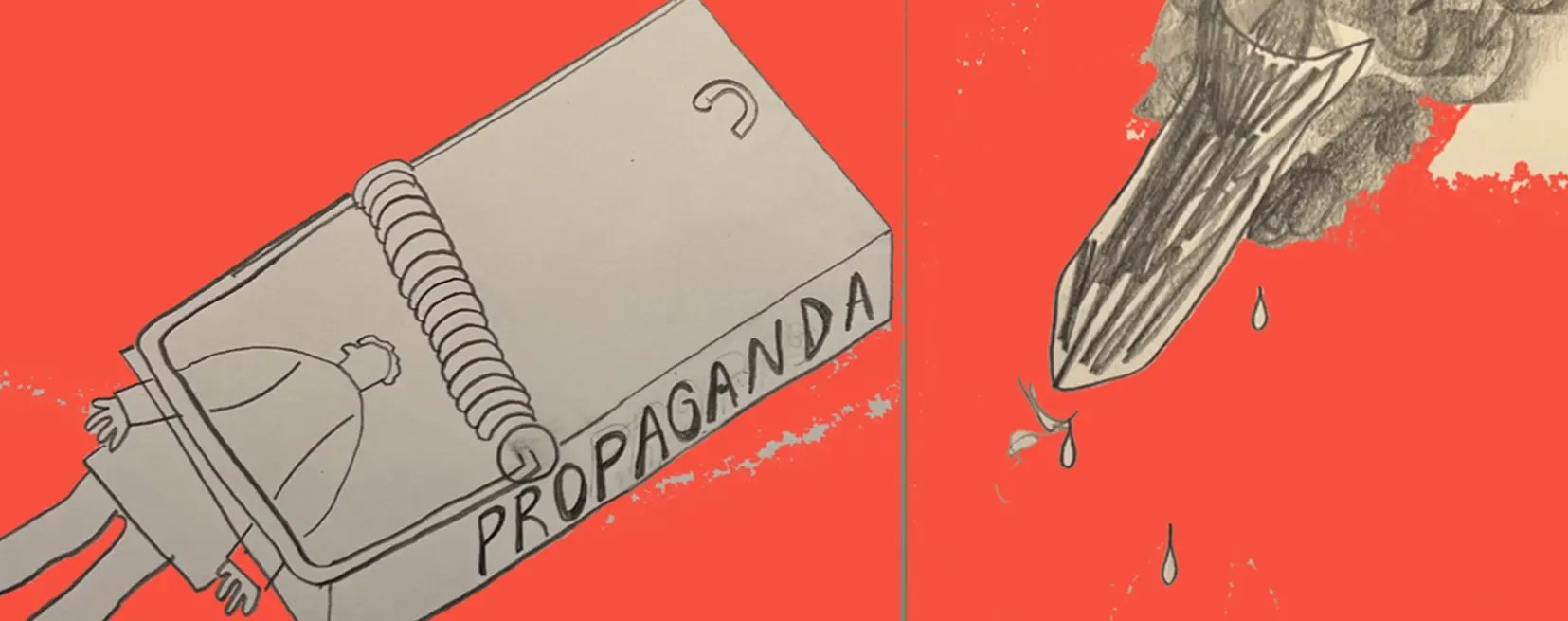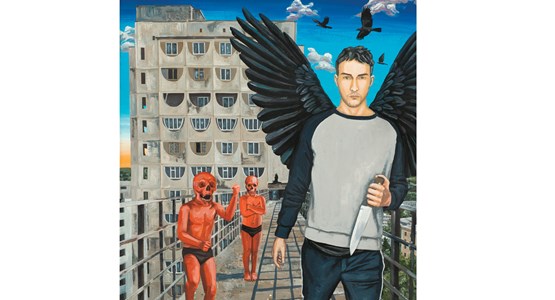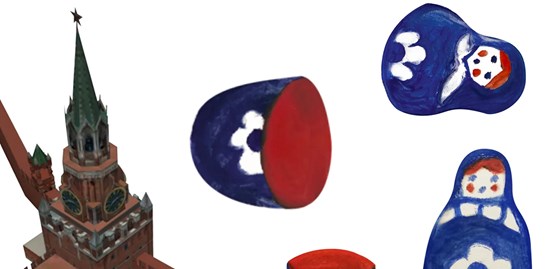
The Past Is In War - Vladimir Putin and the Instrumentalization of History
22.08.2022 | 9 Min to readAt another conference back in 2007, Russia’s then, and now, President Vladimir Putin spoke about what it means to be in a bad mood. He frankly acknowledged interacting with his dog Connie and reading Omar Khayyam’s poetry as a helpful way of dealing with such moments. Incidentally, Putin also mentioned Khayyam both during his visit to Saudi Arabia and in an interview with Al Jazeera.[i]
The Persian poet wrote this rubaiyat quatrain:
“Into the garden flew a drunken nightingale,
Delighting in our laughter, toothy smile.
It whispered softly into my ear:
‘Grab hold, since life—once lost—cannot be had again.’”
It is hard to tell whether or not the president of the Russian Federation really gets the gist of this rubaiyat, in which Khayyam speaks of restoring the past. But one thing is clear: Putin attaches excessive importance to shaping the memories of the past.
When it came to politics of memory, the government of Boris Yeltsin, the first president of the Russian Federation, tried to break away from the Soviet past as far as possible. Troves of documents previously classified under Soviet rule were disclosed, and civil society organizations were given a chance to work actively on such topics as terror, various types of deportation, and mass state violence. The public space saw the emergence of the memorialization of the victims of repressions. Foreign researchers set out to work in Russian archives, and their findings informed lively international debates.
In the 1990s, Yeltsin’s government launched a major experiment seeking to transition the country from the socialist economic system to a market economy. Criticizing the Soviet system and re-interpreting it in those hard times was not only recommended but rather necessary. Alongside distancing itself from the Soviet past, Yeltsin’s government paid great deal of attention to 18th-19th-century Russia and its culture, and its imperial past in general, to present the country to the public as a brand-new European empire.
In December 1999, Yeltsin resigned. His successor, a former officer of the Soviet Committee for State Security, Vladimir Putin, completely changed the politics of memory and set out to rehabilitate the Soviet period. For the most part, memory was now grounded not so much in the Soviet era as a whole, but more specifically in the World War II period. Putin increasingly edged out organizations creating alternative narratives. In the same vein, previously opened archives were gradually shut down, with access denied first to local researchers and eventually to foreigners.
The early 2000s saw an increase in oil prices globally. Russia’s economy eventually recovered from the crisis and grew stronger. The new authorities of the country rich in mineral resources opted in favour of a conservative method of development. As the architect of new Russia, Vladimir Putin stood proudly at international forums to present his vision of the future. Despite these rhetorical presentations, the country’s economy, similar to memory, relied on the past, and so the politics of memory was tied to the Soviet Union. Unlike Yeltsin, Putin turned the Soviet legacy into a symbol of national consensus, prosperity, and power.
In the beginning of the 2000s, relative prosperity and self-sufficiency took root in Russia. The political elite and middle class began to identify themselves with the state—or rather what was defined by objective circumstances as “the state”—and the state economy had turned into a major source of income for both. The idea of a state also became important to the bureaucratic class that had appropriated political and economic power in the country. Some of those who are still around are former officers of the Committee for State Security, making up the main pillar of Vladimir Putin’s human resource policy. Most of the economists and oligarchs from Yeltsin’s team supporting a liberal economy became Putin’s valuable partners. But those who resisted the new realities created by the authorities found themselves behind bars or fleeing the country. The concept of a strong state succeeded in neutralizing revolts and the opposition of various interest groups.
The 1990s in Russia was a period of economic crisis, growing oligarchic rule, weakening state institutions, and media outlets under the thumb of oligarchs, making it difficult to represent historical symbols. But the main goal in the initial period of Putin’s rule was to restore the country’s “honour” in the international arena and position Russia as “an equal partner”.
Putin, throughout his early period in power, sought historical symbols and, in interviews, consistently referred to different leaders from Russia’s past. Ultimately, however, he was unable to shape these symbols. The year 2007 marked a breakthrough in this regard. It was exactly in that period that Vladislav Surkov developed the concept of sovereign democracy, triggering major discussions in both Russia and the international community.
Equally unexpected was the history schoolbook by Phillipov which, for the first time since 1956, commended Stalin’s role in the history of the Soviet Union, though it also did put the responsibility for repressions on him. In a way, it was a historical mix that promoted the shaping of Stalin’s image as “an effective manager”.
Yeltsin and his entourage were never powerful enough to control the historical narrative by conducting an aggressive “memory policy”. Putin, on the other hand, jumped headlong into carrying out his own by concentrating power and establishing control over the media. The medium for the traditional historical narrative was replaced with the television format that could entertain wider audiences. Documentaries told the public about Russia’s greatness, especially about the heroic battles during World War II, attempting to heroize various military officers and secret services. They were portrayed as the most loyal servants of the homeland standing up to the “evil” bureaucracy. Meanwhile, discussions on repressions and terror vanished from the public space altogether.
Putin picked World War II as a main entry for his new memory policy for a reason. On one hand, it is a historical event marking a major victory. On the other hand, it is a living memory still very much present for families. Besides, victory is something both Stalin’s proponents and opponents agree on. Putin somehow altered the myth of Brezhnev’s era about the superiority of Socialism and the role of the Communist Party defining victory in this war. Rather, Putin declared the patriotism of the Russian people, not of the Soviet people, as the main driving force behind victory, and replaced the party’s dominance with state management. Russian historian Andrei Fursov openly criticized the country’s authorities, arguing that no great victory is ever achieved without a great commander-in-chief—Stalin in this case—something that he insisted had to be clearly proclaimed.
Over his first years at the helm of the country, Putin frequently mentioned Stalin in a positive context, though he never did at May 9 parades, the cornerstone underpinning the carnivalization of his memory policy. Stalin’s rehabilitation has its own boundaries, and as Putin is trying to come across as democratic, he can’t allow the dictator’s full public rehabilitation.
Besides working toward the domestic consumption of its memory policy, Russia is also striving to export it abroad. Although the entire Soviet Union participated in World War II, it was the Ukrainian SSR, along with the Russian SFSR and the Belorussian SSR, that suffered the greatest loss, and it was their territories where the fiercest action took place. Since 2005, the disagreements between Russia and Ukraine about issues concerning memory have become particularly striking and extreme. Building a nation with a common past and mythology proved problematic in Ukraine because of the bilingualism of the population. Things are further complicated by the fact that the territory of Ukraine had once been split between Poland, Romania, and the Austro-Hungarian and Russian Empires, while its western part was incorporated into the Soviet Union only after 1945.
As a republic, Ukraine was fully integrated into the Soviet political system, had a formidable political weight, made a considerable contribution to the Soviet economy, and had a living memory of World War II. Consequently, despite intense and continuous attempts, Moscow never succeeded in demonizing Ukrainian guerrillas. Ukrainian nationalism was taking hold as early as the Soviet era.
In the 1990s and early 2000s, the Ukrainian state tried to strike a balance in developing narratives to stave off radicalization and confrontation in society. On October 28, 2004, Vladimir Putin attended a parade celebrating Ukraine’s liberation from the Nazis. The relatively peaceful event soon morphed into a war of narratives.
Viktor Yushchenko came to power as a result of the Orange Revolution. His main opponent, Viktor Yanukovych, was the leader of the pro-Russian Party of Regions and enjoyed support from the Russian-speaking segment of the population. The party’s relations with Ukraine’s Nationalists and National Democrats went from bad to worse. And it was at that time that talks about two Ukraines—two Ukrainian identities—picked up in Russia.
At first, Yushchenko tested the waters with a policy of balance, but later joined the narrative of the fight for Ukraine’s freedom and sovereignty. In 2009, he stated on air: “We must have a history of our own. Ukraine’s history is a history of fighting for independence. We have a right to revise, and we are entitled to evaluate.”
The main idea of Yushchenko’s memory policy lay in the 1932-1933 famine, known as the Holodomor, which claimed several million lives—the exact number is unknown. Legislative work commenced in Ukraine’s Rada and, in 2007, a bill recognizing the Holodomor as genocide was produced.
Yushchenko also promoted the heroization of two controversial figures: Stepan Bandera, a leader of the Organization of Ukrainian Nationalists (OUN), and Roman Shukhevych, a military leader of the Ukrainian Insurgent Army (UPA). He conferred the title of Hero of Ukraine—the country’s highest national title—on Shukhevych in 2007 and on Bandera as late as January 22, 2010. Since 2016, Poland has been commemorating almost 100,000 innocent victims slaughtered in Volhynia and Eastern Galicia. It happened back in 1943, when a military operation was carried out in hundreds of Polish villages. Historians are quite vocal about the participation of Stepan Bandera and the Ukrainian Insurgent Army in this operation.
Yushchenko believed that, unlike World War II, every side would identify with the Holodomor equally. The narrative labelling the Moscow Communists as bloodthirsty murderers was embraced by the Eastern Ukrainians; Western Ukraine could not share the same beliefs since at that time this portion of the country was not incorporated into the Ukrainian SSR.
Defining the country’s common past and distancing it from Russia has been the main challenge facing the shaping of Ukraine’s memory policy in recent years, with the major driver being Russia’s memory policy, which would not settle just for domestic public consensus and sought to spill over in the immediate neighbourhood.
On February 22, 2022, with the political tensions between Russia and Ukraine flying high, Vladimir Putin, in his address to the public, spoke about the common past of the two countries. He outlined the boundaries within which he saw the Ukrainians: a unity of Orthodox Christian Slavs that had existed for centuries and was only later divided into national entities by Lenin. Similar to every historical manipulation, only a fragmented version of history was offered. This address was not limited to the Soviet Union and World War II, but also “reminded” Ukrainians that they had shared a common history prior to the era of the Russian Empire.
Vladimir Putin’s policy attempts to build a future on the past. Future past, a term coined by Givi Alkhazishvili, best reflects this vision. Apparently, he does not really understand Khayyam’s adage that life—once lost—cannot be had again. Instead, he stubbornly keeps pressing—this time on Ukraine.
On February 24, 2022, Russian troops invaded Ukraine. I am writing this essay as active military operations are unfolding. Information is spreading in a flash. The flow of disinformation and fake news is impressive, and the future seems pretty uncertain in this situation. As of now, May 20, 2022, the only thing that the author of these words can say with a fair level of certainty is that this war will create not only a new geopolitical reality, but also a new memory policy.
In the meantime, let’s watch things unfold, because the past has also been drafted into the war.
_____________________________
[i] Kakie knigi chitaet I rekomenduet Vladimir Putin [Books That Vladimir Putin Reads and Recommends] (August 20, 2016): https://www.knigikratko.ru/articles/kakie-knigi-chitaet-i-rekomenduet-vladimir-putin;
Chto chitaet Vladimir Putin [What Vladimir Putin Reads] (January 20, 2014): . https://www.kommersant.ru/doc/2386556;
Pochemu president Rossii chitaet Omara Khayama [Why President of Russia Reads Omar Khayyam] (July 18, 2007): https://www.nnov.kp.ru/daily/23903.4/232582/https://www.nnov.kp.ru/daily/23903.4/232582/.
ეს სტატია მხოლოდ გამომწერებისთვისაა. შეიძინე შენთვის სასურველი პაკეტი





